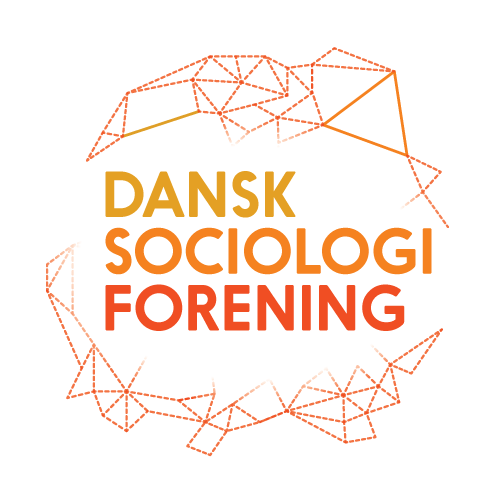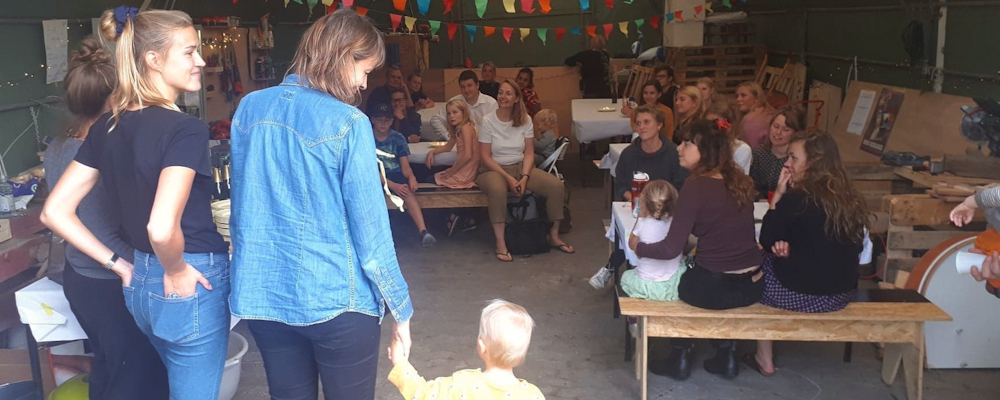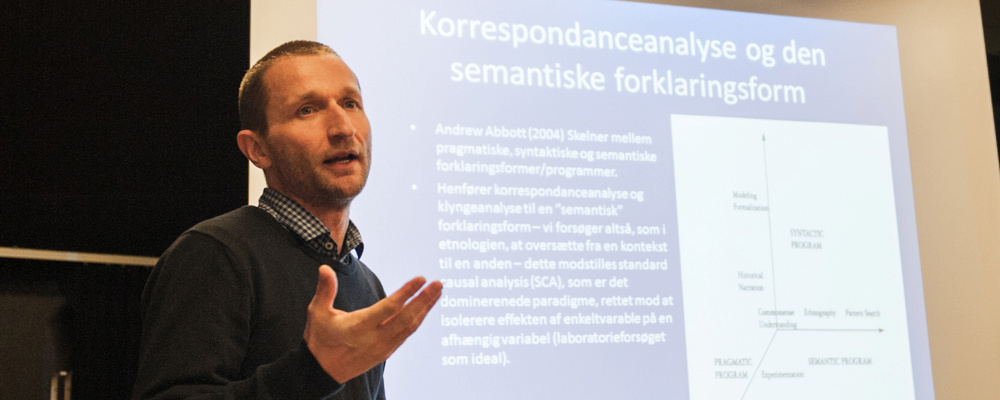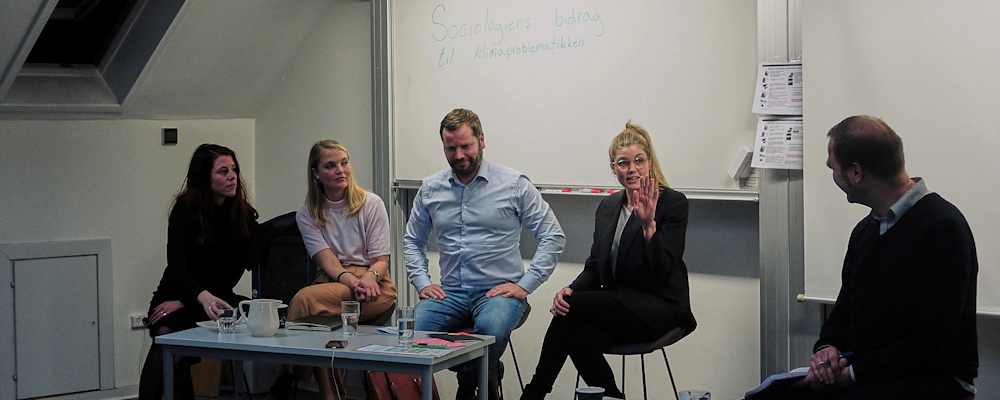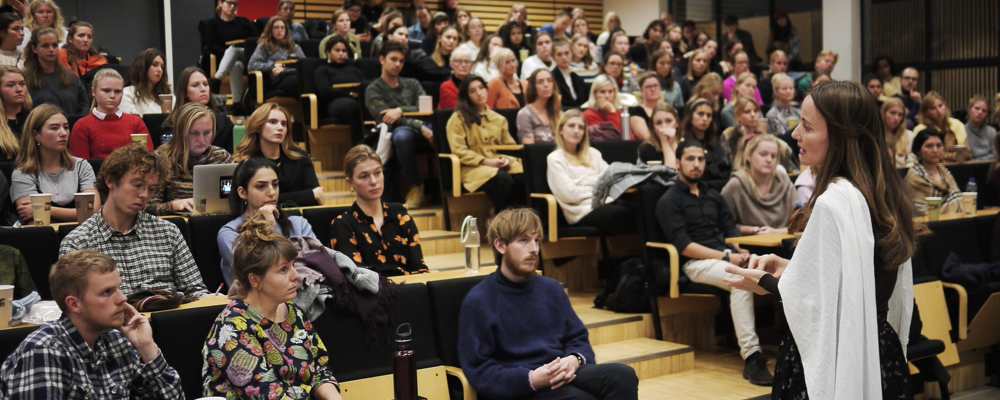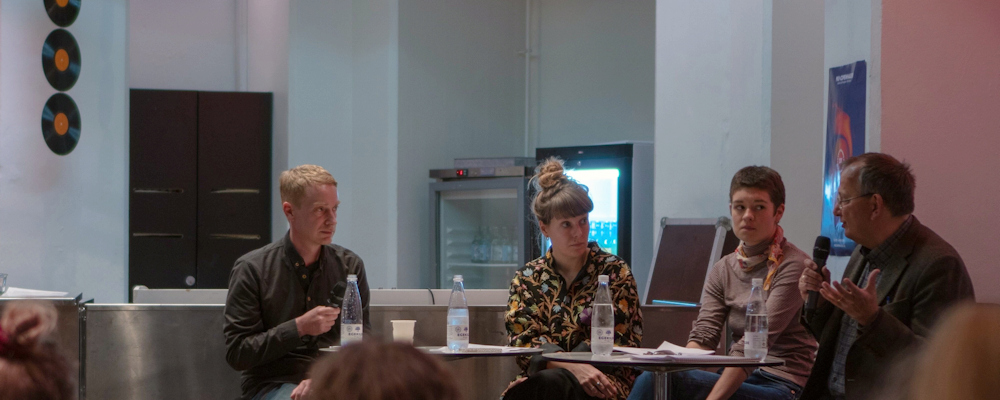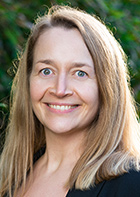
Lektor Anna Ilsøe, FAOS, Sociologisk Institut, er valgt som ny formand for Dansk Sociologiforening. Samtidigt skifter foreningen navn fra Dansk Sociologforening til Dansk Sociologiforening, og vedtægterne revideres, således at alle der arbejder med sociologi eller sociologisk analyse i Danmark kan optages som medlemmer uanset deres uddannelsesbaggrund. Formålet er at udvikle foreningen til en bred samfundsvidenskabelig forening, der repræsenterer alle i den offentlige eller den private sektor samt alle studerende, der arbejder sociologisk. Anna Ilsøe tiltræder som formand med en baggrund i mere end 10 års arbejdsmarkedsforskning ved Forskningscenter for Arbejdsmarkeds- og Organisationsstudier (FAOS), der har til huse på Sociologisk Institut, Københavns Universitet. Hun har udover sine videnskabelige publikationer om den danske model deltaget flittigt i debatten i medierne samt holdt adskillige oplæg om modellen inden for som uden for universitetets mure.
FOREDRAG OM BOURDIEU OG KLASSE
Forlaget Hexis afholder den 15. april et arrangement med foredrag om Bourdieu og klasse.
Oplysninger om arrangementet findes her.
PROGRAM FOR SOMMERHØJSKOLE
Programmet for sommerhøjskolen den 23-27. juni er nu tilgængeligt.
Du kan læse mere om arrangementet her og se det fulde program her
PETITION ON SOCIAL SCIENCES AND HUMANITIES IN EUROPE
The ESA has launched a petition addressed to European Parliament, the Council and European Commission in order to ask for more support of Social Sciences and Humanities in Europe. We invite you to sign it and share it with your contacts.
The petition can be signed here:
https://secure.avaaz.org/en/petition/SSH_community_members_Call_to_Action/?nuRwgjb
SPÆNDENDE FOREDRAG PÅ CBS
På CBS afholdes en række foredrag i løbet af foråret under titlen: Crowd Dynamics in Financial Markets.
Information om foredragene finder på her.
Paneldebat om repræsentation af social ulighed i de danske medier
Paneldebat om repræsentation af social ulighed i de danske medier den 23. februar 2015
Lukas A. Lausen fra Ulveman & Partners og chefredaktør på Ræson, styrer debatten, og panellisterne er:
Lars Benjaminsen (SFI)
Henrik Dahl
Christina Fiig (AU)
Teaser: Social ulighed er igen kommet på dagsordenen. Vi hører dagligt om en stigende polarisering af rig og fattig, og den stigende økonomiske ulighed er udråbt som blandt de allerstørste udfordringer, som den vestlige verden står over for i disse år. Spørgsmålet er imidlertid, hvilken rolle medierne spiller i at sætte social ulighed på dagsordenen. Formålet med paneldebatten er at give nogle forsøgsvise svar på dette spørgsmål. De fire debattanter diskuterer tre overordnede spørgsmål: 1. Hvilke og hvis stemmer hører vi i debatten? 2. Hvordan omtales udsatte grupper i medierne i dag – og med hvilke konsekvenser? 3. Har journaliststanden som erhvervsgruppe og medierne mere generelt overhovedet en interesse i at belyse social ulighed og genintroducere ”klassekampen” som tema? Arrangementet starter med, at panelet diskuterer disse spørgsmål, og efterfølgende åbnes der for salen. Vel mødt til en vigtig diskussion om social ulighed og de danske medier.
Paneldebat om repræsentation af social ulighed i de danske medier
den 23. februar 2015
Lukas A. Lausen fra Ulveman & Partners og chefredaktør på Ræson, styrer debatten, og panellisterne er:
Lars Benjaminsen (SFI)
Henrik Dahl
Christina Fiig (AU)
Teaser: Social ulighed er igen kommet på dagsordenen. Vi hører dagligt om en stigende polarisering af rig og fattig, og den stigende økonomiske ulighed er udråbt som blandt de allerstørste udfordringer, som den vestlige verden står over for i disse år. Spørgsmålet er imidlertid, hvilken rolle medierne spiller i at sætte social ulighed på dagsordenen. Formålet med paneldebatten er at give nogle forsøgsvise svar på dette spørgsmål. De fire debattanter diskuterer tre overordnede spørgsmål: 1. Hvilke og hvis stemmer hører vi i debatten? 2. Hvordan omtales udsatte grupper i medierne i dag – og med hvilke konsekvenser? 3. Har journaliststanden som erhvervsgruppe og medierne mere generelt overhovedet en interesse i at belyse social ulighed og genintroducere ”klassekampen” som tema? Arrangementet starter med, at panelet diskuterer disse spørgsmål, og efterfølgende åbnes der for salen. Vel mødt til en vigtig diskussion om social ulighed og de danske medier.
Sociologisk sommerskole
Tag med på Sociologisk Sommerhøjskole
23.-27. juni 2015
I anledning af foreningens 50 års jubilæum afholdes en sommerhøjskole i samarbejde med Jyderup Højskole. Målet er skabe et rum for dybdegående diskussioner, faglig opdatering, eftertanke og sociologisk nørderi.
Sommerhøjskolen består af en bred vifte af workshops tilrettelagt af sociologer fra hele landet. Så kom og vær med, når emner som store data, finanskrise, evidens, selvrealisering og Udkantsdanmark tages under kærlig og kritisk behandling.
Vi lægger løbende programmet op på FaceBook: https://www.facebook.com/sociologisksommerhoejskole2015
Tilmelding foregår på Jyderup Højskoles hjemmeside:
———————————————————–
Husk at der på mandag d. 23/2-15, afholdes paneldebat og generalforsamling i Dansk Sociologforening. Det starter kl. 17.00 på Center for Sundhed og Samfund i Christian Hansen Auditoriet. Se mere her.
Kom og lyt og debatter med panellisterne, og vær med til at have indflydelse på din forening til generalforsamlingen bagefter. Generalforsamlingen foregår i lokale 16.2.55. Materiale vedrørende generalforsamlingen finder du her.
DANSK SOCIOLOGFORENING FYLDER 50 – KOM OG VÆR MED TIL AT FEJRE DET!
Kære medlem af Dansk Sociologforening,
Den 25. marts 1965 blev Dansk Sociologforening grundlagt. Foreningen har igennem hele 50 år repræsenteret sociologien og organiseret sociologer i Danmark – og det skal fejres!
Derfor er det en fornøjelse at kunne invitere dig til en festlig fejring af Sociologforeningens jubilæum onsdag d. 25. marts kl. 17.00-20.30 ved Sociologisk Institut på Københavns Universitet.
Arrangementet starter med et blik på dansk sociologi gennem de sidste 50 år. Til det formål har vi inviteret Göran Therborn (University of Cambridge) og Kristoffer Kropp (Roskilde Universitet). Therborn vil diskutere dansk sociologis rolle i den nordiske sociologi, og Kropp vil give et kritisk overblik over dansk sociologis udvikling igennem de sidste 50 år. Der vil også være mulighed for at stille spørgsmål fra salen.
Vi inviterer også til en efterfølgende reception, hvor der vil være mulighed for at få et glas vin, en snack og en snak med tidligere kolleger og fagfæller.
Program for arrangementet finder du her.
Tilmelding er ikke nødvendig.
Vel mødt!
Bestyrelsen i Dansk Sociologforening
DANSK SOCIOLOGFORENING FYLDER RUNDT!
Den 25. marts 1965 blev Dansk Sociologforening grundlagt. Foreningen har igennem hele 50 år repræsenteret sociologien og organiseret sociologer i Danmark – og det skal fejres!
Derfor er det en fornøjelse at kunne invitere dig til en festlig fejring af Sociologforeningens jubilæum onsdag d. 25. marts kl. 17.00-20.30 ved Sociologisk Institut på Københavns Universitet.
Arrangementet starter med et blik på dansk sociologi gennem de sidste 50 år. Til det formål har vi inviteret Göran Therborn (University of Cambridge) og Kristoffer Kropp (Roskilde Universitet). Therborn vil diskutere dansk sociologis rolle i den nordiske sociologi, og Kropp vil give et kritisk overblik over dansk sociologis udvikling igennem de sidste 50 år. Der vil også være mulighed for at stille spørgsmål fra salen.
Vi inviterer også til en efterfølgende reception, hvor der vil være mulighed for at få et glas vin, en snack og en snak med tidligere kolleger og fagfæller.
Program for arrangementet finder du her
Tilmelding er ikke nødvendig.
Vel mødt!
Bestyrelsen i Dansk Sociologforening
